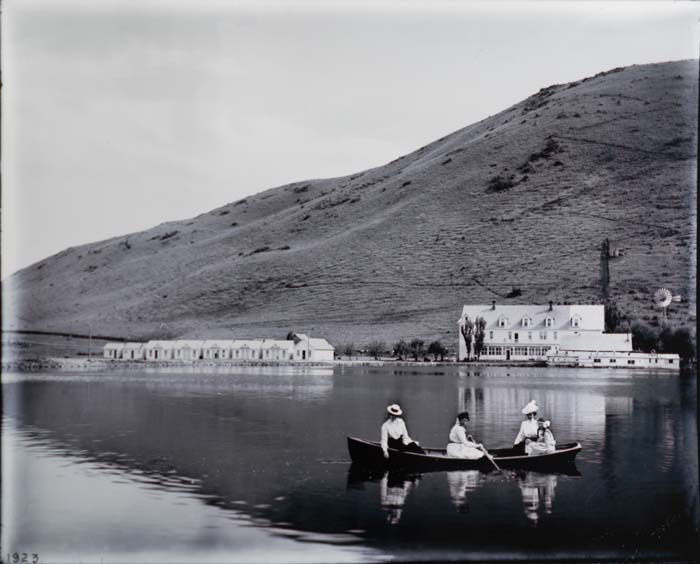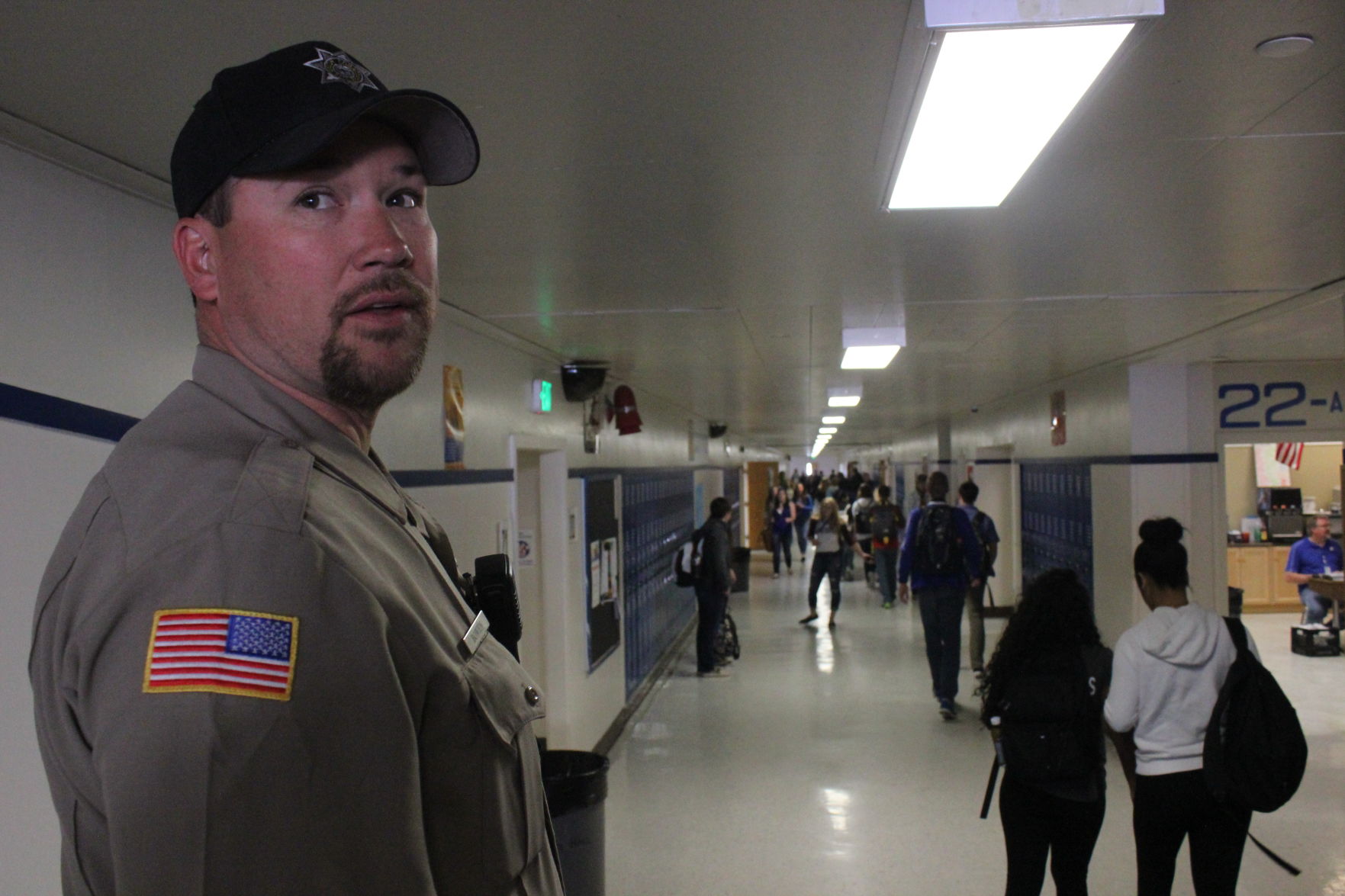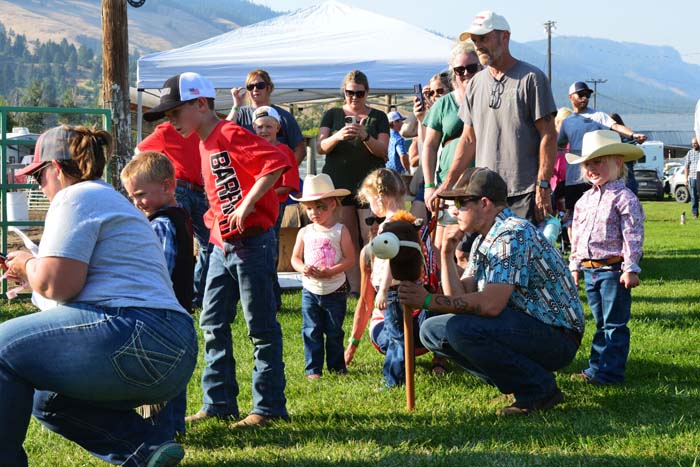Preserving Hot Lake’s history
Published 7:00 am Thursday, December 2, 2021

- Women boating in the Hot Lake west of Hot Lake's buildings, circa 1902.
HOT LAKE — Gunshots in 1883 and stirring words of patriotism in 1919 from one of the United States’ most influential evangelists.
Trending
These are some of the echoes being awakened from La Grande’s and Hot Lake’s past by author and historian Richard “Dick” Roth, of Orting, Washington.
Roth is the author of four books dedicated to Hot Lake. Although he lives in Washington, he knows Hot Lake firsthand, for he grew up there. His parents, the late A.J. and Fern Roth, owned Hot Lake from 1942 to 1974.
The historian is donating his archive of newspaper and magazine articles about Hot Lake and Northeastern Oregon to Hot Lake’s owners, Michael and Tamarah Rysavy. The clippings are in nine large three-ring notebooks, two of which are filled with historic photos.
Trending
“What Dick has given us is irreplaceable. We are blessed to have all of this information,” said Michael Rysavy, who purchased The Lodge at Hot Lake with his wife in 2020.
‘Dance of death’
The earliest piece Roth has in his collection is from the June 27, 1868, edition of the Blue Mountain Times. Hot Lake was mentioned in that edition in an article about the Grande Ronde Valley’s highlights.
Clippings from the 19th century also include an article from the March 9, 1883, edition of The States Rights Democrat in Albany, about a shooting that took place at Hot Lake’s old dance hall in March 1883, one which ultimately claimed two lives. Eighteen people were in the hall at a dance when pistol shots rang out and instantly claimed the life of one Clay Miller. Another man, Henry Green, was also hit and died three years later from the effects of his wounds, according to a later news article.
“This shows that the old West was alive and well at Hot Lake in 1883,” Roth said.
The shooting incident was described as taking place at what turned out to be a “dance of death” and was reportedly sparked by an argument over a bottle of whiskey. The man who allegedly fired the deadly shots escaped the dance hall but was captured the next day between Hot Lake and North Powder. The murderer was tracked down by two men named Thomas Johnson and and Nick Beli who walked through snow 2-3 feet deep, according to the account in the Albany newspaper.
A guest to remember
Thirty-six years later a man preaching the importance of God’s love was a guest at Hot Lake, famed evangelist Billy Sunday, according to a story in the July 13, 1919, edition of Portland’s Oregon Daily Journal. Sunday, a well-known American evangelist at the time, stayed at Hot Lake after delivering a patriotic address in La Grande on Friday, July 4, 1919.
Several influential people made a point of greeting Sunday at Hot Lake.
“He was the most celebrated and influential American evangelist in the first two decades of the 20th century,” Roth said.
Sunday, who was from the Midwest, may have been returning from Hood River since he owned an apple orchard there.
Complaints and praise
The clippings in Roth’s collection indicate that 102 years ago people had many of the same concerns then that they do today. For example, a story in the April 26, 1919, edition of the Oregon Daily Journal is headlined “Trains Will Muffle Noises at Hot Lake.” The article states the Oregon Railroad & Navigation Company officials have agreed to keep the noise of trains passing through Hot Lake to a minimum.
“Considerable discomfort had been caused the patients at the Hot Lake sanitarium due to the noise of train whistles and switching operations,” the article stated.
The story said that in the future only sounds essential to the operation of trains would be permitted. This article appeared a century before the city of La Grande became a whistle free zone, where trains are no longer allowed to sound their horns due to years of complaints from residents and visitors.
Roth’s collection also includes a five-part series about Hot Lake by Fred Lockley in the Oregon Daily Journal of Portland in March of 1919. Lockley wrote that Hot Lake, which then was a hospital, had a bright future as a medical facility.
“The time is approaching when the fame of Hot Lake will be as well known to those in the West who need surgical attention as Rochester, Minnesota, is today through the work done by the Mayo brothers,” Lockley wrote.
A collection decades in the making
Michael Rysavy said the items donated by Roth will be used to help with the creation of a museum focusing on Holt Lake’s history that he and his wife plan to begin creating in the near future. He said information from the collection will guide them in the process of assembling the exhibits.
Roth’s collection includes articles written through 1990. They cover the many roles Hot Lake has had, for it has served as a hospital, a hotel and an agricultural production site, among other capacities.
Roth gathered many of his clippings from the Oregon Digital Newspaper Program, the Library of Congress Chronicling America Program and microfilm reels from the University of Oregon’s Knight Library.
“I’ve been collecting them since I was in junior high,” he said.
He donated his collection to Michael and Tamarah Rysavy because he wanted to help preserve the history of the region and knew the Rysavys would value the artifacts.
“I did not want them to disappear from the Grande Ronde Valley,” Roth said.
The museum the Rysavys will be creating will display a number of articles and photos from Roth’s collection. The museum is one of a number of features the Rysavys will be adding at The Lodge at Hot Lake. Also in the works is a restaurant, pubs and a 60-seat movie viewing room.
Hot Lake’s present amenities include overnight lodging and five soaking pools, which allow people to enjoy some of the site’s geothermally heated water. The soaking pools are available only to overnight guests now but later will be open to day visitors.
Roth said he is impressed with the work the Rysavys are doing at Hot Lake.
“They are interested in factual history and are dedicated,” he said.
He said it is unfortunate that myths about Hot Lake have arisen over the years. These include stories of ghosts and tales of the facility being used for purposes such as a tuberculosis hospital, which isn’t true.
Roth said Hot Lake’s story does not have to be fabricated or embellished to be captivating.
“Truth is often more interesting than fiction,” he said.









